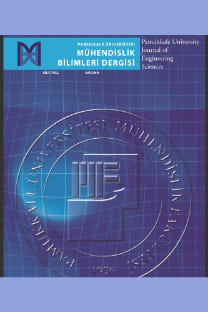Petrol projelerinde kullanılan su arıtma tesislerinde su ve petrolün ayrıştırılması için tasarlanan birleştirilmiş plakaların CFD simülasyonu
HAD, İki fazlı akış, Karışımın hızı, Akışkanın hacmi, Laminer akış
___
- Algifri AH, Bhardwaj RK, Rao YVN. “Turbulence measurements in decaying swirl flow in a pipe”. Applied Scientific Research, 45(3), 233-250, 1988.
- Escobar OM. The graduate school performance evaluation of modified liquid-liquid cylindrical cyclone. Petroleum Engineering The Graduate School The University of Tulsa, 2005.
- Razi FA, Pendashteh A, Abdullah LC, Biak DRA, Madaeni SS, Abidin ZZ. “Review of technologies for oil and gas produced water treatment”. Journal of Hazardous Materials, 170(2-3), 530-551, 2009.
- Razi FA, Alireza P, Zainal AZ, Chuah AL, Awang BDA, Siavash MS. “Application of membrane-coupled sequencing batch reactor for oilfield produced water recycle and beneficial re-use”. Bio Resource Technology, 101(18), 6942-6949, 2010.
- Hashim R, Abdolhamid, Al-baghdadi MARS, El hinshiri AK. “Evaluation of bio-surfactants enhancement on bioremediation process efficiency for crude oil contaminated soil at oilfield”. Strategic Study, 20, 25-30 2009.
- Veil JA, Markus G, Puder, Elcock D, Robert J, Redweik J. “A White Paper Describing Produced Water From Production Of Crude Oil”. Natural Gas and Coal Bed Methane Produced Water P0401pdf, USA, Technical Report, 2004.
- Zhaohui X, Ashok M, Wilfred C. “Detection of benzene, toluene, ethyl benzene and xylenes (BTEX) using toluene dioxygenase-peroxidase coupling reactions”. Biotechnology Progress, 19(6), 1812-1815, 2003.
- Agency USEP. “National center for environmental assessment-Washington office of research and development”. Carcinogenic Effects of Benzene: An Update, Washington, DC, 57 1998.
- Reusser DE, Field JA. “Determination of benzyl succinicacid in gasoline-contaminated ground water by solid-phase extraction coupled with gas chromatography”. Mass Spectrometry, 953, 215-225, 2002.
- Halliburton. ‘’Water management [online]’’. http://www.halliburton.com (17.09.2011).
- James PR, Rainer EF. “Produced Water”. Technological/Environmental Issue and Solutions. In Environ. Sci. Res. pp 616 1993.
- Khatib Z, Verbeek. “Water to Value Produced Water Management for Sustainable Field Development of Mature and Green Fields”. Journal of Petroleum Technology, 55(1), 26-28, 2003.
- Andresen PAK, Arntzen R, Sjøblom J. “Stability of model emulsions and determination of droplet size distributions in a gravity separator with different inlet characteristics”. Colloids and Surfaces A, 170(1), 33-44, 2000.
- Klasson KT, Taylor PA, Walker JF, Jr, Jones SA, Cummins RL, Richardson SA. “Modification of a centrifugal separator for in-well oil-water separation”. Separation Science and Technology, 40(1-3), 453-462, 2005.
- Wang Y, James PW. “Calculation of wave-plate demister efficiencies using numerical simulation of the flow field and droplet motion”. Chemical Engineering Research and Desing, 76(48), 980-985, 1998.
- Zhao Y, Hua W, Wang YJ, Ma SC, Yan J. “Numerical simulation of separation efficiency of demisters with serrated baffles in wet flue gas desulfurization towers”. Journal of Chinese Society of Power Engineering, 25, 293-297 2005.
- Zhong WQ, Xiong YQ, Yuan ZL, Zhang MY. “DEM simulation of gas-solid flow in a spout-fluid bed”. Chemistry Engineering Sciences, 61(5), 1571-1584, 2006.
- Cooper S, Coronellat CJ. “CFD simulations of particle mixing in a binary fluidized bed”. Powder Technology, 151(1-3), 27-36, 2005.
- Nowakowski AF, Cullivan JC, Williams RA, Dyakowski T. “Application of CFD to modeling of the flow in hydrocyclones. Is this a realizable option or still a research challenge?”. Minerals Engineering, 17(5), 661-669, 2004.
- Ansys Fluent Guide (ANSYS FLUIENT). Theory And Guide in 2009.
- Computational Analysis for Multi-Phase Flow in Helical Water Oil Separator Using (Cfd) Submitted to The College of Graduate Studies. Texas A&M University-Kingsville In Partial Fulfillment Of The Requirements For The Degree Of Master Science, May, 2006.
- Abdurahmann H, Nour, Mohd A, Hassan A, Yunus RM. “Characterization and demulsification of water-in-crude oil emulsions”. Journal Applied Sciences, 7(10), 1437-1441, 2007.
- Chen L, Wul S, Lu H, Huang K, Zhao L. “Numerical simulation and structural optimization of the inclined oil/water separator”. PLoS ONE, 10(4), 1-15, 2015.
- Brackbill JU, Kothe DB, Zemach C. “A continuum method for modeling surface tension”. Journal of Compututational Physics, 100(2), 335-354 1992.
- Mastouri R. “A Time to Review The Produced Water Treatment Technologies, A Time To Look Forward For New Management Policies”. Islamic Azad University, Arak Branch Civil Engineering Faculty, Daneshgah Street Arak, Iran 2010.
- Schlieper L, Chatterjee M, Henschke M, Pfennig A. ‘’ Liquid–Liquid Phase Separation in Gravity Settler with Inclined Plates.’’ Published online in Wiley Inter Science: www.interscience.wiley.com , April 2004.
- Ivanenko A, Yablokova YU, Petrov SI. “Simulation of the separation of emulsified oil products from water in an apparatus with sinusoidal profiled oleophilic plates”. Theoretical Foundations of Chemical Engineering, 44(5), 729-741, 2010.
- Paulo AB, Sampaioa, Jose LH, Faccinia, B, Su J. “Modeling of stratified gas–liquid two-phase flow in horizontal circular pipes”. International Journal of Heat and Mass Transfer, 51(11-12), 2752-2761 2008.
- Yayla S, Sabah S, Olcay AB. “The separation of Water and Oil in Water Treatment Plant in Petroleum Project using Coalescing Plate Seperator and CFD Simulatio”. International Congress on Engineering and Information (ICEAI), Osaka, Japan, 10-12 May, 2016.
- ISSN: 1300-7009
- Yayın Aralığı: 7
- Başlangıç: 1995
- Yayıncı: PAMUKKALE ÜNİVERSİTESİ
Konik saptırıcılı ısıtıcı borunun etkinliğinin deneysel araştırılması
Bandırma’nın uzun dönem rüzgar karakteristiğinin ve rüzgar enerjisi potansiyelinin incelenmesi
Güneş enerjisi santrali kurulabilecek alanların AHP yöntemi kullanılarak CBS destekli haritalanması
Tornalama işleminde yüzey pürüzlülüğü değerlerinin istatistiksel incelenmesi
Harun AKKUŞ, Harun YAKA, Levent UĞUR
Sedat YAYLA, Soran Sabah IBRAHİM, Ali Bahadır OLCAY
Sakarya Üniversitesi için rüzgâr enerjisi potansiyel belirleme çalışması
Tuncay BİLGE, Ali Rıza MOTORCU, Aleksandar IVANOV
İç akışlardaki hidrodinamik giriş uzunluğu üzerine hesaplamalı akışkanlar dinamiği analizleri
Emre KAHRAMANOĞLU, Savaş SEZEN, Seyfettin BAYRAKTAR
Tip-II montaj hattı dengeleme problemi için büyük komşuluk arama algoritması
